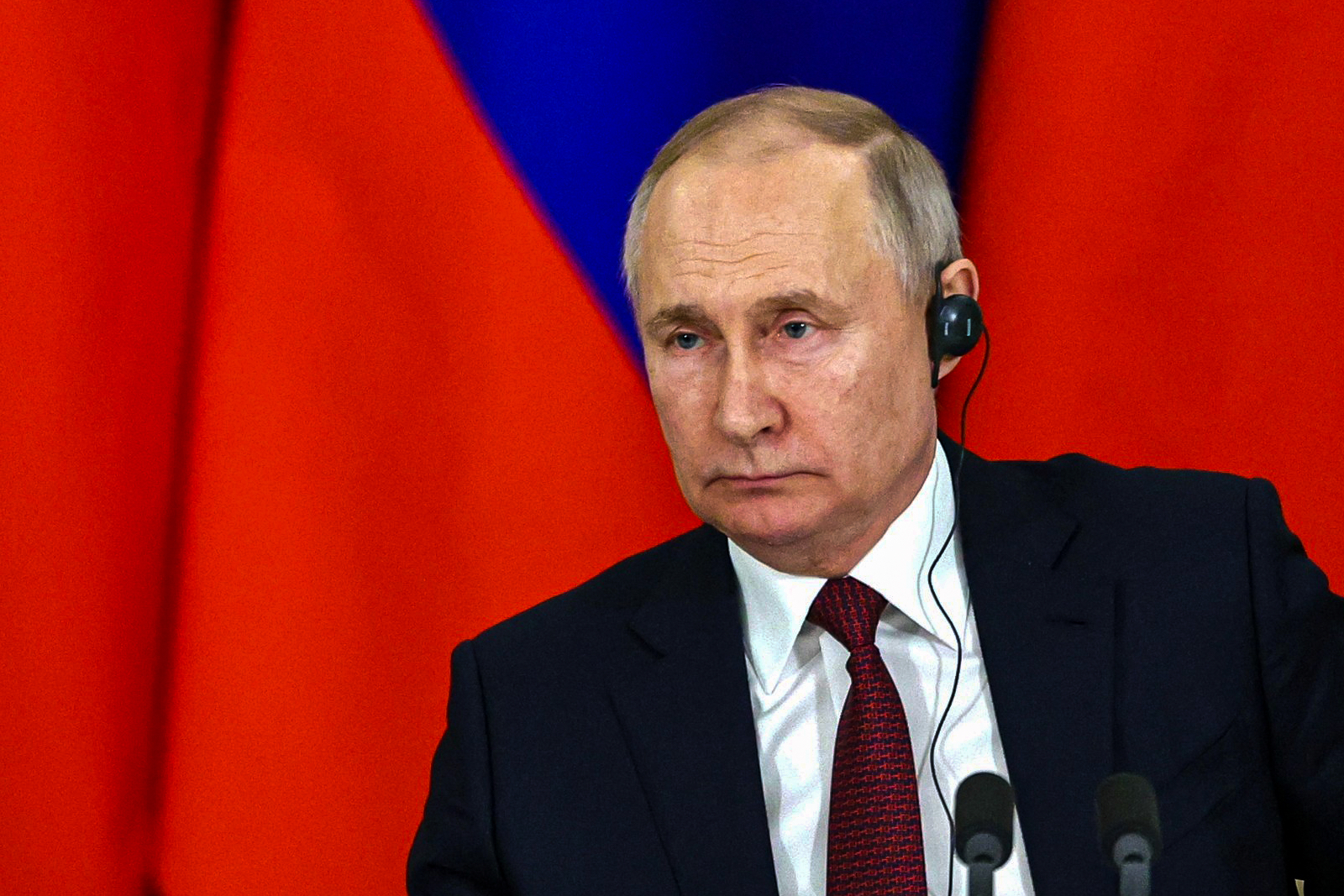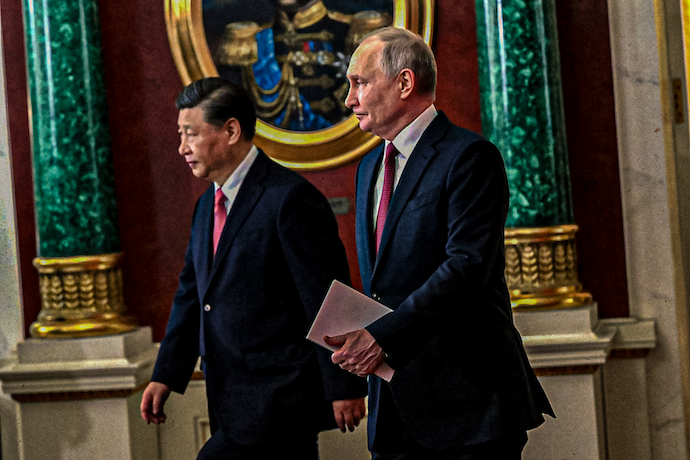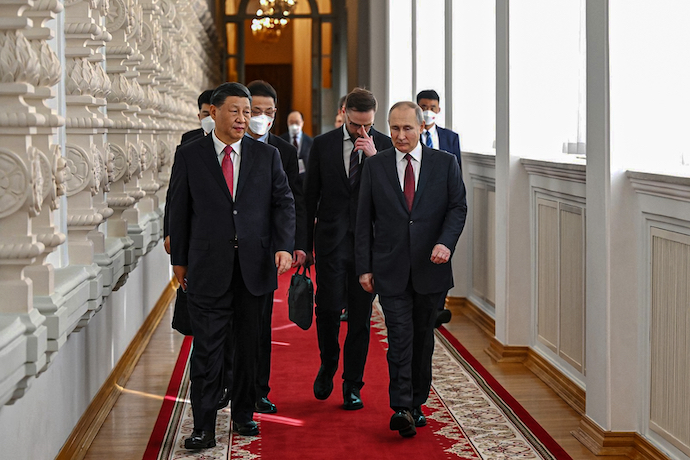
Putin and Xi’s ‘Bromance’ Deepens out of Necessity
Chinese President Xi Jinping walked a diplomatic tightrope when he visited Moscow earlier this week, seeking to present China as a global peacemaker while strengthening ties with Russian President Vladimir Putin, his closest ally, who is increasingly isolated by the West. Washington denounced Xi’s visit, saying it showed Beijing was providing Moscow with “diplomatic cover” to commit more atrocities in Ukraine.
On Sunday morning, Putin visited the city of Mariupol, a day after surprising observers with a visit to Crimea. During his visit to Russian-occupied Mariupol, Putin drove around the city and visited several districts, meeting with top military officials who lead the ongoing Russian military operation in Ukraine.
Putin is now also facing an arrest warrant from the International Criminal Court for alleged war crimes. The court has accused Putin of bearing personal responsibility for the abduction of Ukrainian children.
Under the Fourth Geneva Convention, Article 49 prohibits the forced transfer of protected persons, which includes civilians who are living in an area that is affected by an armed conflict. The article states that “Individual or mass forcible transfers, as well as deportations of protected persons from occupied territory to the territory of the Occupying Power or to that of any other country, occupied or not, are prohibited, regardless of their motive.”

Over the last few decades, Putin has portrayed himself as a leader and strongman through various means, both domestically and internationally. Domestically, Putin has employed a number of tactics to cultivate this image. He has focused on strengthening state institutions, cracking down on political opposition, and consolidating power. Putin has also used state media to control the narrative and shape public opinion in his favor. Additionally, he has cultivated an image of physical strength and masculinity through staged photo opportunities, such as horseback riding, hunting, and martial arts.
On the international stage, Putin has projected strength through a number of actions. He has pursued an aggressive foreign policy, annexing Crimea in 2014 and supporting separatists in eastern Ukraine. Putin has also intervened militarily in Syria, supporting the Bashar al-Assad regime. Additionally, he has sought to undermine Western democracies through the spread of disinformation and support for far-right political parties.
Putin has positioned himself as a defender of traditional values, such as nationalism, conservatism, and the Russian Orthodox Church. This has helped him appeal to a broad swath of the Russian population and bolster his domestic support. This effort to portray himself as a strongman has been a deliberate strategy to consolidate power domestically and project strength internationally. However, this has come at the cost of suppressing political opposition, undermining democratic institutions, and contributing to international tensions.
With this strongman image, the ICC charge, and Xi’s visit, Putin continues to demonstrate, at least publicly, that he remains undeterred by international moves against him and is instead focused on building his relationship with China and Iran.
Despite facing increased scrutiny of its military objectives and Western scrutiny of prominent Chinese companies like TikTok, why is Xi unwavering in his support of Putin, knowing that this could lead to blowback?

From Beijing’s perspective, staying strategically connected to Russia is necessary due to its worldview. China believes that the U.S., with the support of European governments, is impeding China’s path toward global leadership and that many of its neighbors, such as Japan, South Korea, Vietnam, and India, are distancing themselves rather than moving closer.
Since 2013, Xi and Putin have exhibited what some experts have called a “bromance” by which they have shared friendly moments beyond diplomatic protocol. These rare moments are important between leaders of countries that are powerful players on the international level. This is especially true with regard to Russia and China.
As highlighted by Xi’s visit, China, and Russia in particular have been working to strengthen their relationship in recent years, with both countries benefiting from this partnership.
For China, a closer relationship with Russia offers several advantages. First, it provides China with a reliable energy supplier. Russia is one of the world’s largest producers of oil and gas, and China is the world’s largest energy consumer. A closer partnership with Russia allows China to diversify its energy sources and reduce its dependence on other countries.
Second, a closer relationship with Russia allows China to balance against the United States. As China continues to rise as a global power, it faces increasing pressure from the U.S., which has sought to contain China’s influence. By aligning with Russia, China can build a counterweight to the U.S. and increase its leverage in international affairs.
For Russia, a closer relationship with China also offers several benefits. First, it provides Russia with an important trading partner. As the U.S. and Europe have imposed crippling economic sanctions on Russia, China has become an increasingly important market for Russian exports.
A closer relationship with China allows Russia to diversify its foreign policy and reduce its dependence on the West. Russia has been increasingly isolated from the West in recent years, and a closer partnership with China allows it to expand its diplomatic reach and influence.
A closer relationship between China and Russia benefits both countries. China gains a reliable energy supplier and a counterweight to the U.S., while Russia gains an important trading partner and a way to reduce its dependence on the West. As China and Russia continue to deepen their partnership, it is likely that both countries will seek to leverage this relationship to their advantage on the global stage.
